Tail-Wagging Happiness: Essential Tips To Boost Your Dog’s Mental Health And Well-Being
In life’s bustling and unpredictable journey, our furry friends offer more than just companionship; they bring joy, comfort, and unconditional love. However, just like us, dogs experience a spectrum of emotions and can face challenges in their mental and emotional well-being. Understanding and nurturing the mental health of our canine companions is as vital as caring for their physical needs. This comprehensive guide offers 40 essential tips to ensure your dog’s mental health remains robust, staving off depression and anxiety. From the importance of regular exercise and social interaction to the benefits of aromatherapy and professional help, each tip is a stepping stone towards a happier, healthier life for your four-legged friend. Let’s delve deeper and learn how to give our loyal companions the joyful and fulfilling life they deserve.
Regular Exercise
Regular exercise is a must if you want your pup to be healthy and happy. It can be likened to a daily gym session. A long walk every day isn’t just a stroll; it’s an adventure. It lets them explore the world and use up that bottled-up energy.

Playtime keeps their mind active, whether it’s fetch or a simple game of chase. This isn’t just about running around. It’s about giving them a chance to be curious and playful, to keep both their body and brain in tip-top shape. Think of it as their daily dose of fun and fitness.
Social Interaction
Dogs, like us, need friends. Letting them meet and play with other dogs is a big deal. It’s a time for learning, not just having a grand time. They sniff around, meet new buddies, and learn to behave around others. This isn’t just playtime – it’s their chance to be part of a community.
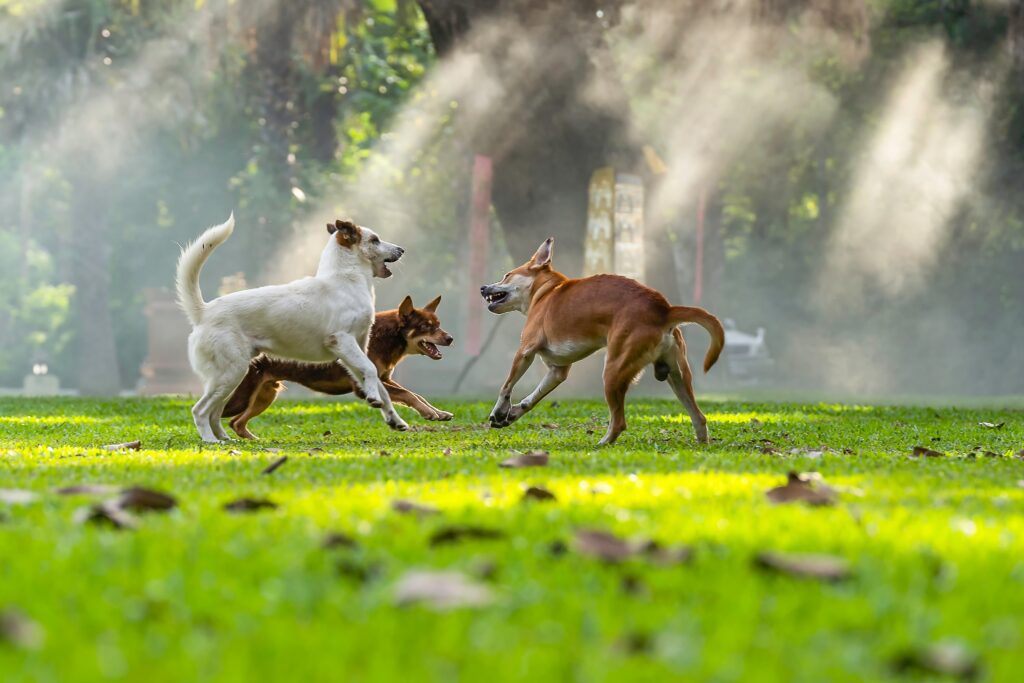
And it’s not just with other dogs. Meeting new people is important, too. It helps them become confident and friendly. Think of it as their way of building a circle of friends, which is important for their happiness and growth.
Training and Obedience
Training is more than teaching dogs tricks. It’s about keeping their minds sharp. Regular training sessions are like school for them. Each new command is a lesson. When they learn to sit, stay, or come when called, they’re solving a puzzle.
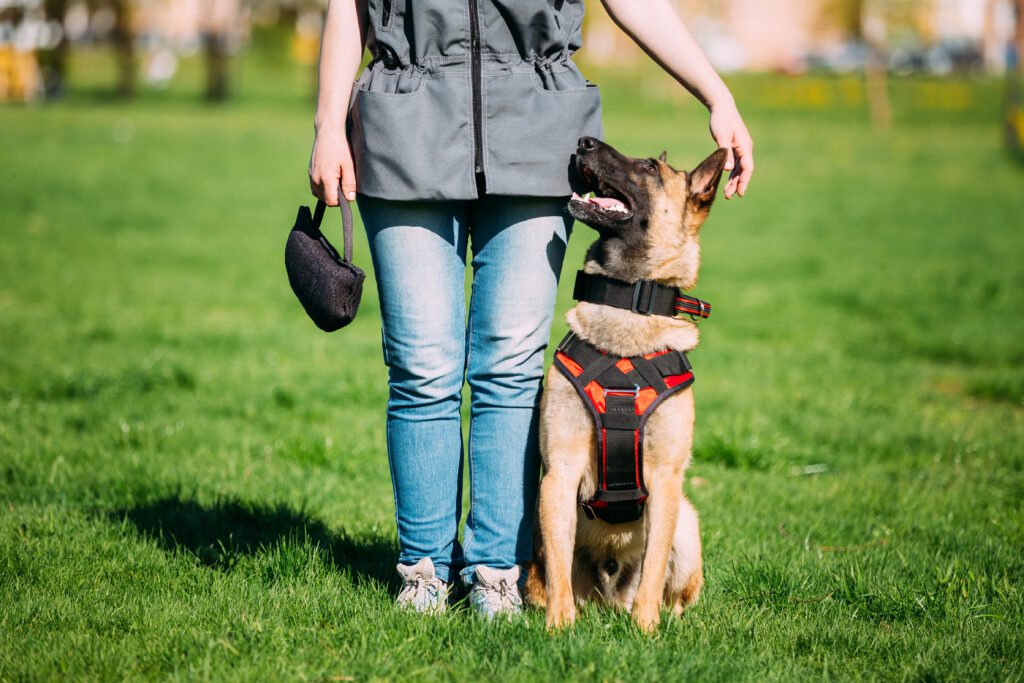
This keeps their brains busy and engaged. And it’s not just stimulating them mentally; it’s also about deepening their connection with you. Every time they learn something new, it strengthens your relationship. Think of it as teamwork – learning and growing together- you and your furry friend.
Mental Stimulation
Dogs need to think and solve problems, just like we do. This is where puzzle toys and games are indispensable. They’re not just for entertainment; they’re brain teasers. It’s a big deal when dogs figure out how to get a treat from a toy.
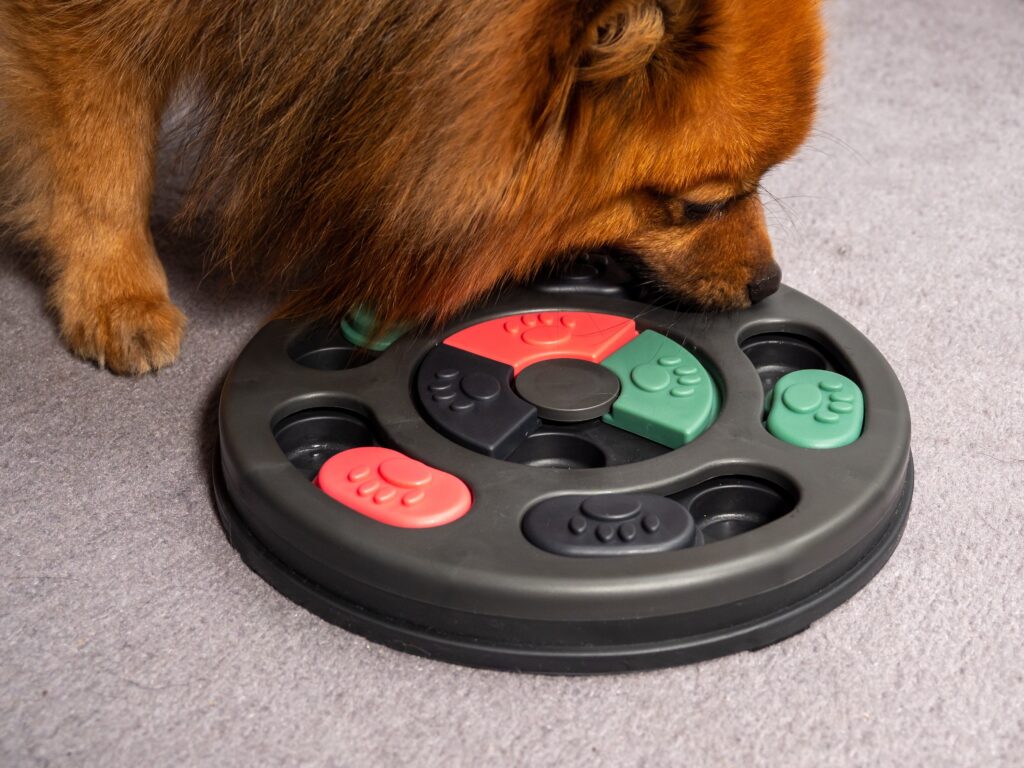
This kind of play is like a mental workout. It challenges them and keeps boredom away in a fun way. Watching them solve these puzzles can be entertaining for pet parents too. It’s all about keeping their brain busy and happy.
Routine
Dogs love knowing what to expect; they do not like surprises. It makes them feel safe. It’s like a daily schedule that tells them when to eat, walk, or sleep. This consistency is comforting for them, helping them feel secure and relaxed.
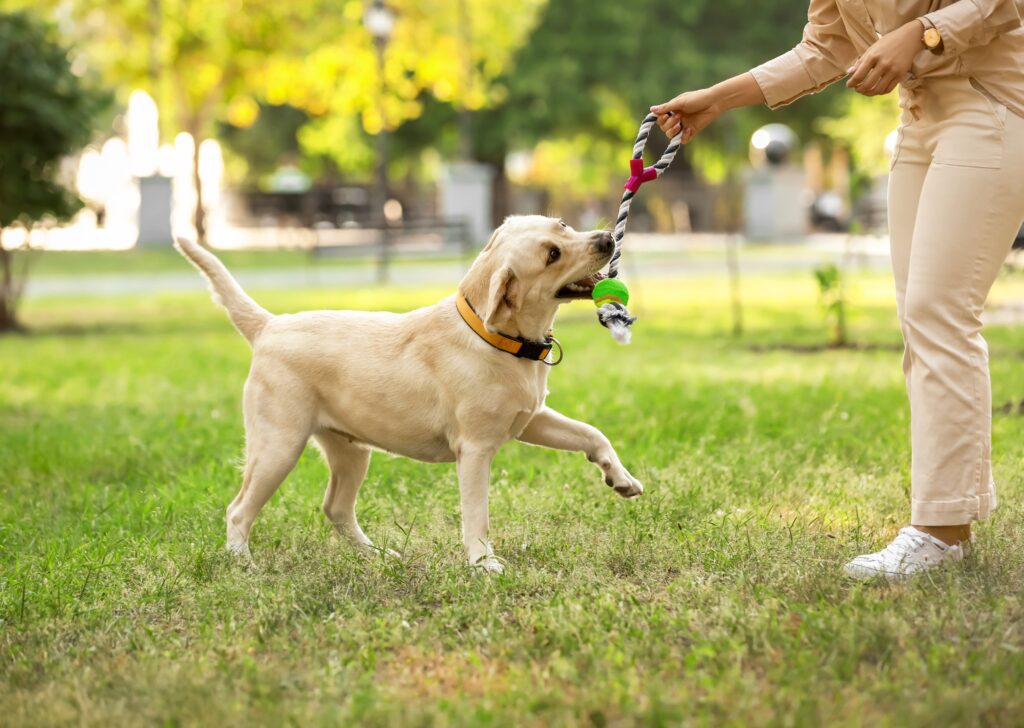
A routine doesn’t mean every day is the same. It just means they have a basic structure to their day. It’s like a safety net, a way for them to know that certain things will always happen. This stability is important for their well-being, keeping them calm and happy.
Positive Reinforcement
Dogs love to please us, and positive reinforcement is a great way to show them they’re doing a good job. Giving them a treat or a pat for good behavior is like saying “well done” in dog language. But it’s more than just treats and pats. It’s about showing them love and approval.
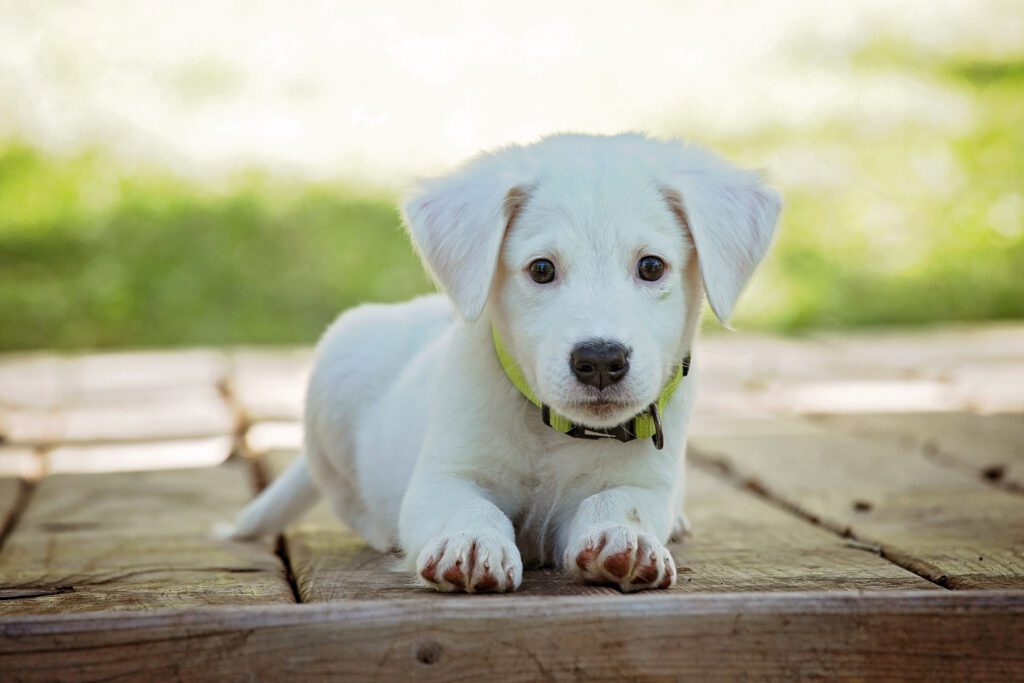
They feel proud when they sit, come, or stay on command, and you respond with a big smile and a kind word. Positive reinforcement makes learning fun for them. Instead of fearing mistakes, they look forward to new challenges, creating a happy, confident dog.
Outdoor Adventures
Dogs have a natural curiosity and love for the outdoors. Taking them on hikes or trips to new places is a great way to satisfy this curiosity. It’s like taking them on a mini-vacation. New smells, sights, and sounds stimulate their senses. It’s more than physical stimulation; it’s a mental one too.
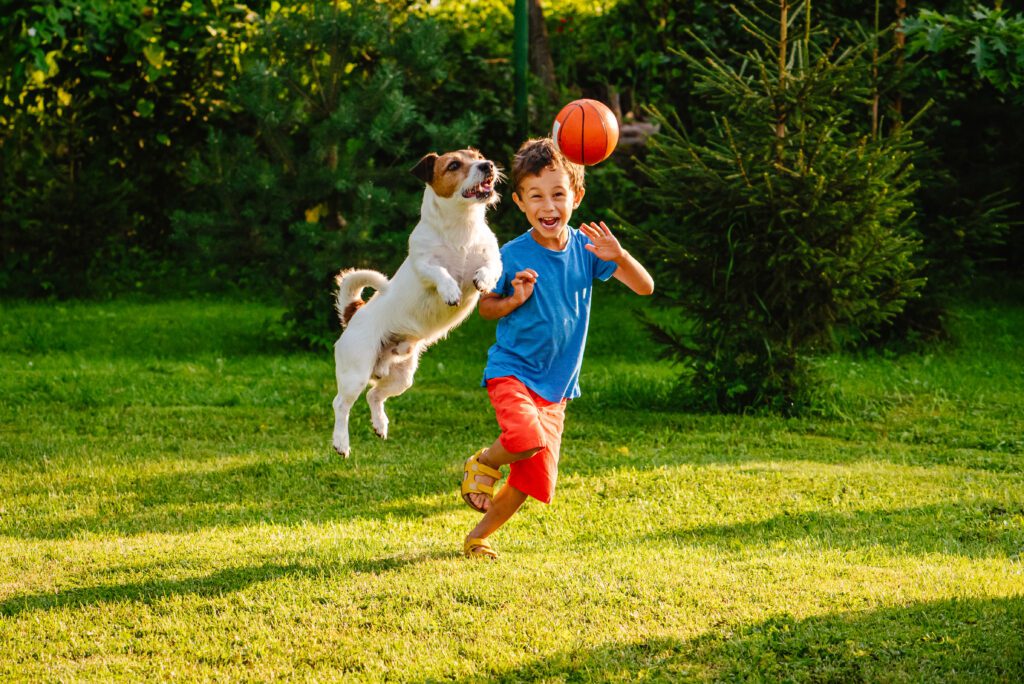
Each new place is an opportunity for socialization. These outings make their life exciting and varied. It breaks the monotony of daily life and keeps them mentally stimulated. Plus, bonding with your furry friend in new and exciting environments is fun.
Comfortable Living Space
Just like us, dogs need a space where they feel safe and comfortable, and it can be anything from a special spot on the couch to a soft bed in a quiet corner. This little haven is especially important in a busy household. Dogs, like people, sometimes need a break from the hustle and bustle.
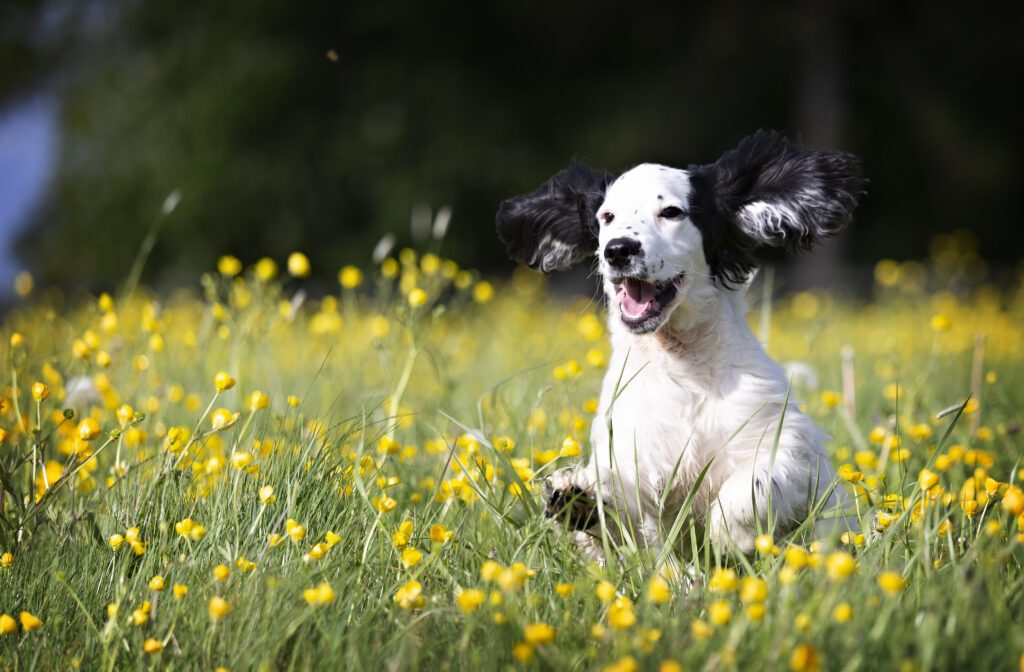
A comfortable living space gives them a sense of security. A soft bed, favorite toys, and maybe even a blanket can easily improve a space. We’re not discussing physical comfort; it’s about giving them a safe, calming environment where they can escape whenever needed.
Healthy Diet
A balanced diet does wonders for a dog. The right food gives them the energy to play and explore. A healthy diet affects everything from their fur to their mood. When they eat well, they feel good. It’s like eating a well-balanced meal – it keeps us healthy and happy.
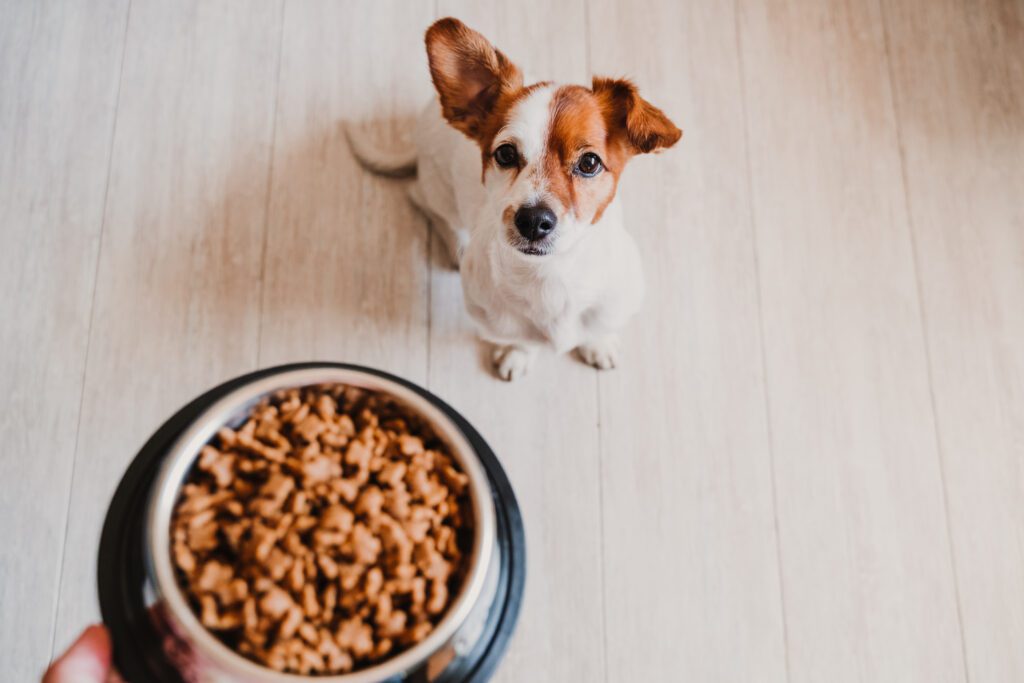
But it’s not just about what they put in their body; it’s also about the quantity. Overfeeding can lead to disastrous results, just like in humans. A good diet and regular exercise are critical for a healthy, happy dog. It all boils down to finding a balance.
Veterinary Care
Regular check-ups at the vet are more than just a health measure; they’re essential for your dog’s overall well-being. Just like people, dogs need professional medical attention to stay healthy. These visits aren’t just for when they’re sick but also about preventing illnesses.
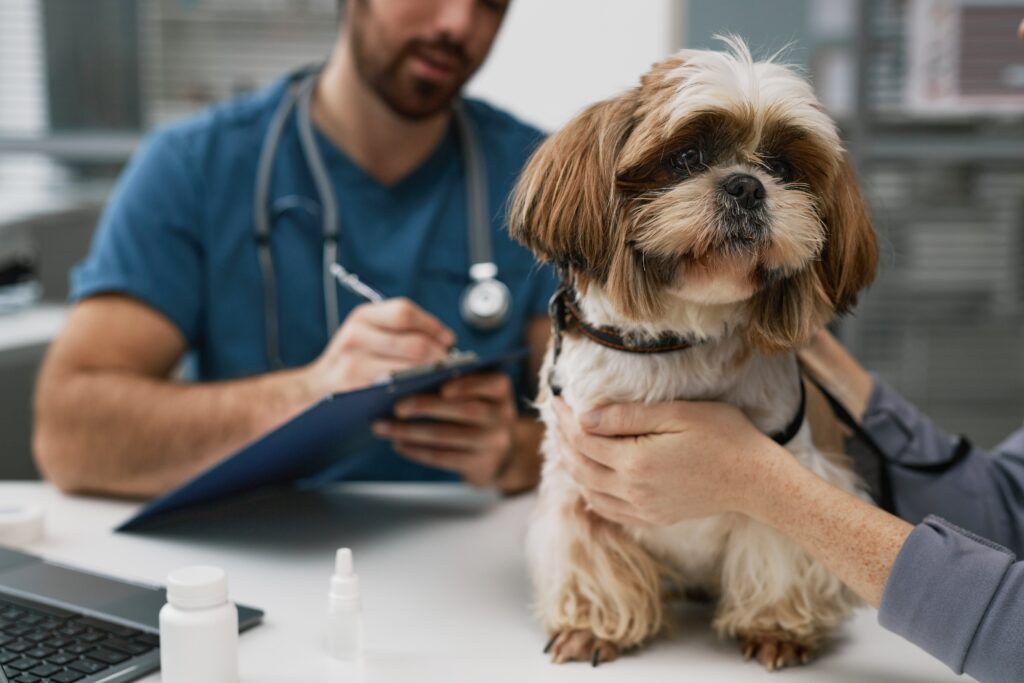
Vaccinations, flea and worm treatments, and health checks keep them in shape. It’s not always fun for them – let’s face it, no one loves going to the doctor – but it’s for their good. Regular visits to the veterinarian are a pet parent’s responsibility.
Massage and Physical Affection
Physical contact is an incredible way to connect with your furry pal. A gentle massage or a good belly rub can improve their mood. Physical affection helps to strengthen your bond with your dog. It can be calming for both of you.
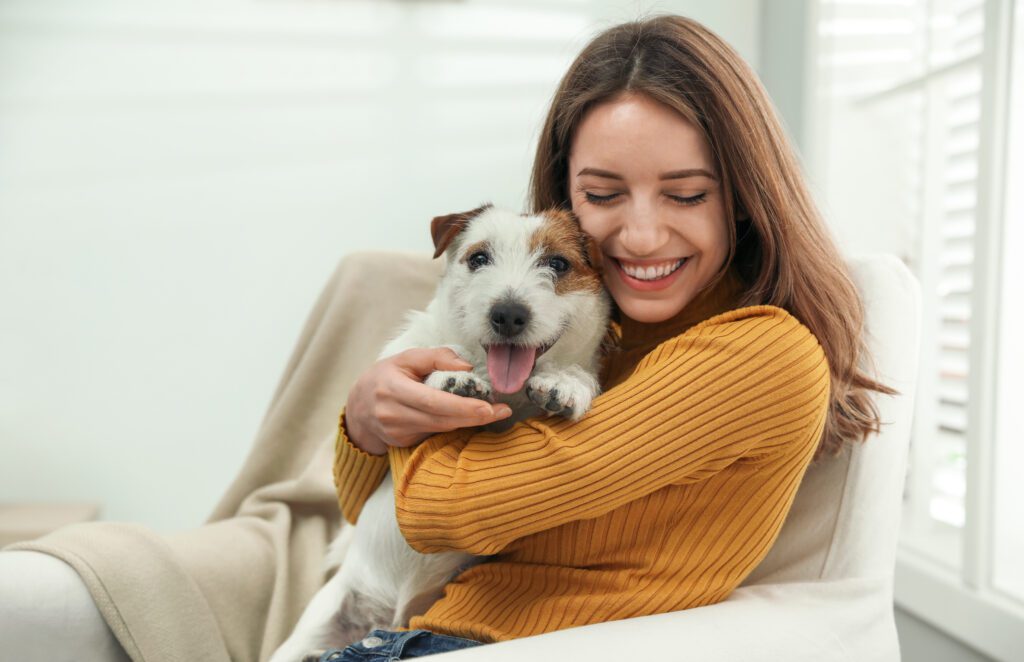
This contact can be especially comforting if they feel anxious or stressed. For dogs, the sense of touch is vital to connecting with the world. By providing regular and loving contact, you’re helping to keep them happy, stress-free, and secure.
Avoid Punishment
Positive training methods are far more effective and kinder than punishment because our furry friends don’t understand punishment like humans. It can make them scared or anxious, which is the opposite of what you want. Instead of punishing them for bad behavior, teach them what you want them to do.

If they make a mistake, guide them gently to the right action. This approach builds trust. They learn you’re a source of guidance and safety, not fear. This kind of positive training leads to a happier, more well-adjusted dog. It’s about understanding and patience, not fear and punishment.
Calm Environment
A peaceful home can greatly reduce anxiety in dogs. Loud noises, shouting, and chaos can be overwhelming for them. It’s like us trying to relax in a noisy, crowded place. Dogs are sensitive to their environment, and you can create a peaceful space for them with a few simple steps.

Things like keeping the volume down, providing a quiet place for them to retreat to, and avoiding sudden, loud noises can make a big difference. It’s about creating a generally peaceful, stable environment. For a dog, a calm home is a happy home.
Music Therapy
Believe it or not, some dogs respond to music. Calming music or white noise can help soothe them, especially in stressful situations. It’s like how some people use music to relax or focus. It doesn’t have to be anything special – just gentle and soothing.

It’s not a cure-all, but it can be a helpful tool in creating a relaxing environment. Experiment with different types of music to see what your dog likes. You might find that they have a favorite genre! Music therapy is a simple, non-invasive way to help keep your furry friend calm and happy.
Aromatherapy
Aromatherapy can be surprisingly effective for dogs. Dogs can be calmed by certain scents, just like us. A vital thing to remember is to ensure that scents are pet-safe. Some essential oils that are fine for humans can harm dogs, so do your research.

By introducing safe scents like lavender can help soothe and relax them. Introducing the right scents can create a calming atmosphere. It’s a gentle way to help ease their anxiety, especially during stressful times like thunderstorms or fireworks, so give it a go.
Safe Toys
Safe and engaging toys are vital for a dog’s well-being, both physically and mentally. Chewing and playing with toys is not just fun; it’s a stress reliever for them. Too hard toys can damage their teeth, while small, breakable toys can be swallowed.
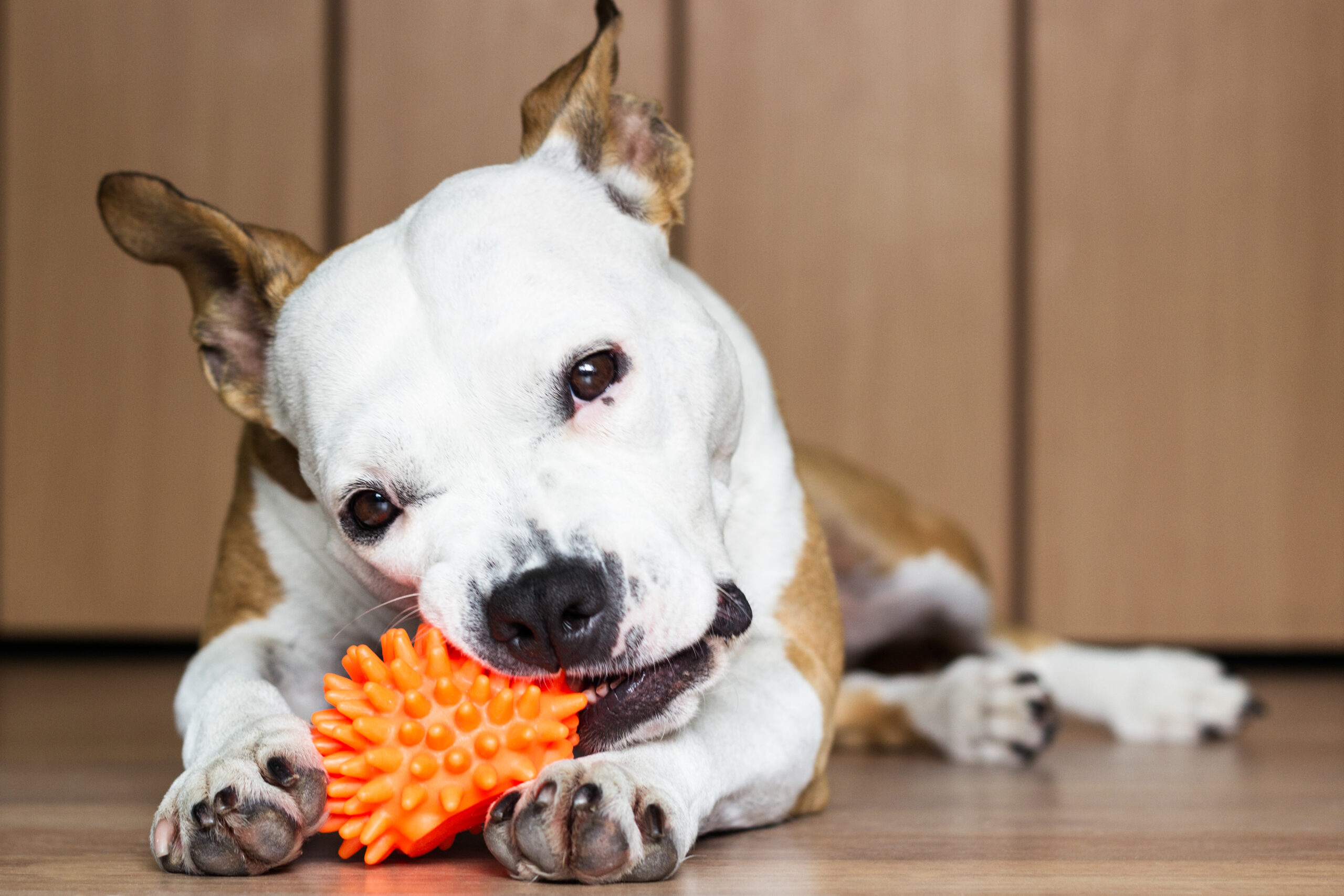
Opt for toys that are durable and are the suitable size for your dog. They should be interesting enough to keep them engaged and safe for their play style. The right type provides an outlet for their energy and curiosity. It’s about giving them fun and stimulation in a safe, healthy way.
Learning New Tricks
Teaching your furry pal new tricks is an excellent way to keep their minds in shape. It’s more than just showing off to friends and family. Learning new commands challenges their brain, like a mental workout. This training also solidifies the bond between you and your dog.
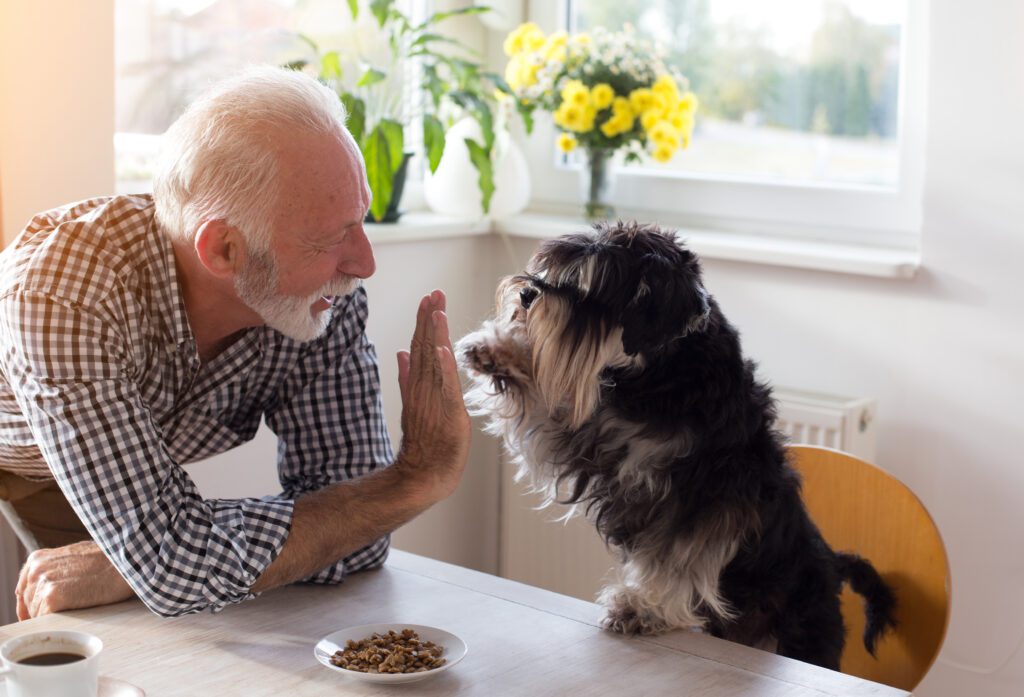
Each new trick is a shared achievement, a moment of connection. It’s important to be positive and patient during the process. Celebrate their successes, no matter how small. Teaching them new tricks is more than just obedience; it’s about giving them opportunities to learn and grow.
Agility Training
Agility training can be rewarding and enjoyable for you and your dog. It’s more than just physical exercise; it’s also a mental challenge. Navigating through an agility course requires concentration, flexibility, and problem-solving. It’s a great way to keep them mentally and physically stimulated.
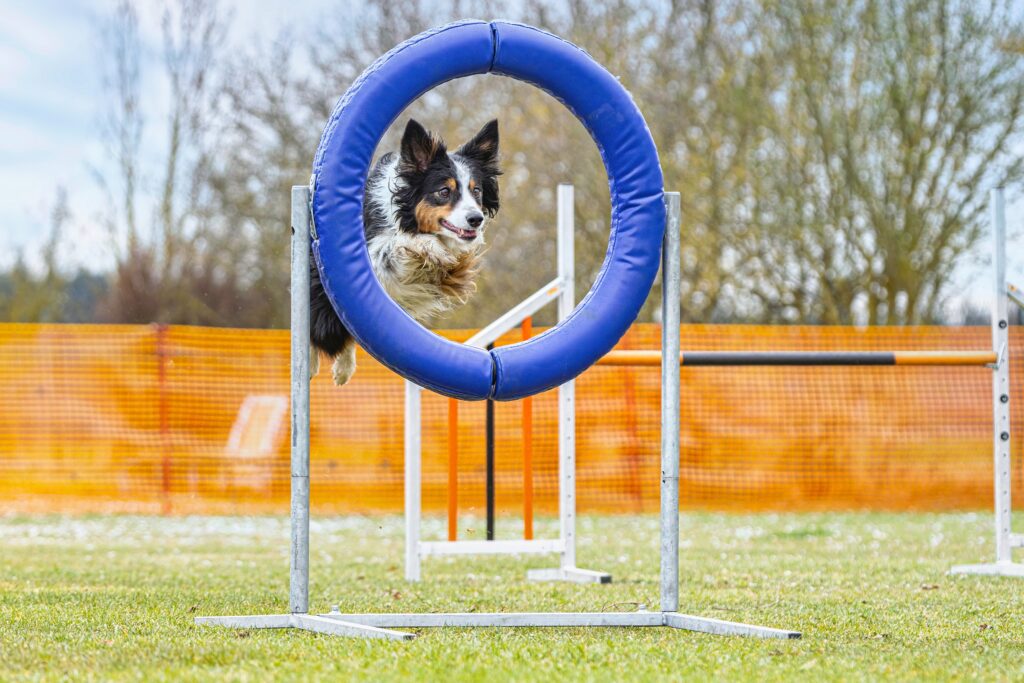
This kind of training strengthens many aspects of their behavior. It improves their focus, obedience, and even their confidence. It is also a fantastic way to bond with your dog, allowing you to work together, navigate challenges, and celebrate victories.
Interactive Play
Interactive play is key to a healthy, happy dog. Games like fetch or tug-of-war require both physical and mental engagement. This kind of play keeps them physically fit and mentally sharp and brings pet parents and four-legged friends closer.
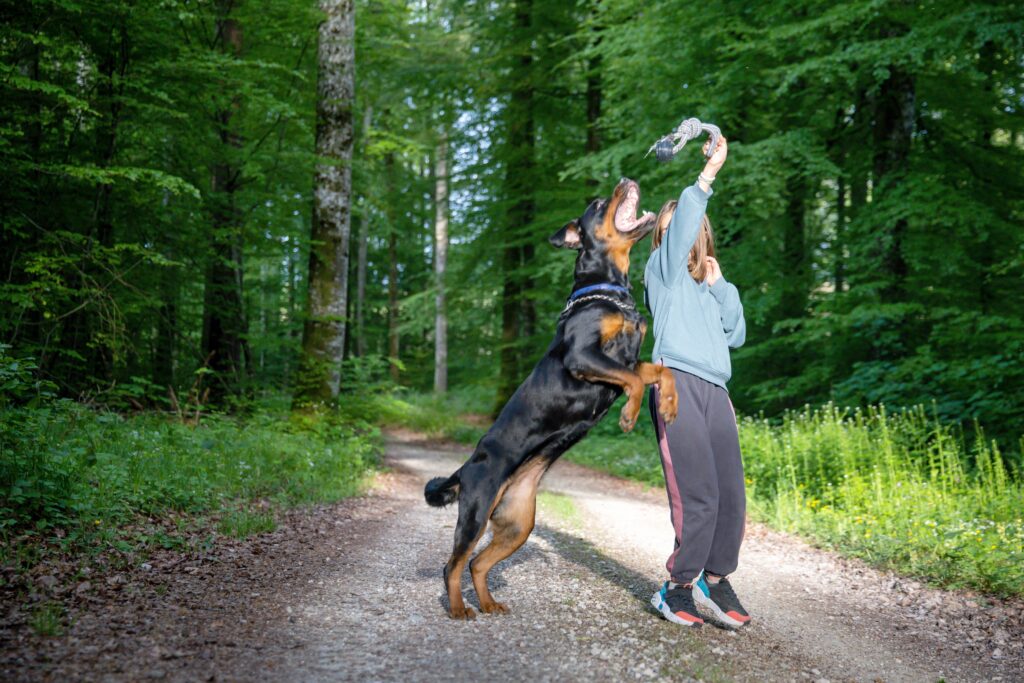
When you play together, it’s a form of communication. It’s more than just fun; it’s a way for you to connect more profoundly. Interactive play is essential for their emotional and social development. It’s a way to show them love and attention in a way that they understand and enjoy.
Doggie Playdates
Arranging playdates with other friendly dogs can greatly enhance your dog’s social life. It’s like setting up a playdate for a child. These interactions are integral to their social development. They learn to behave around other dogs, which is an important part of learning.
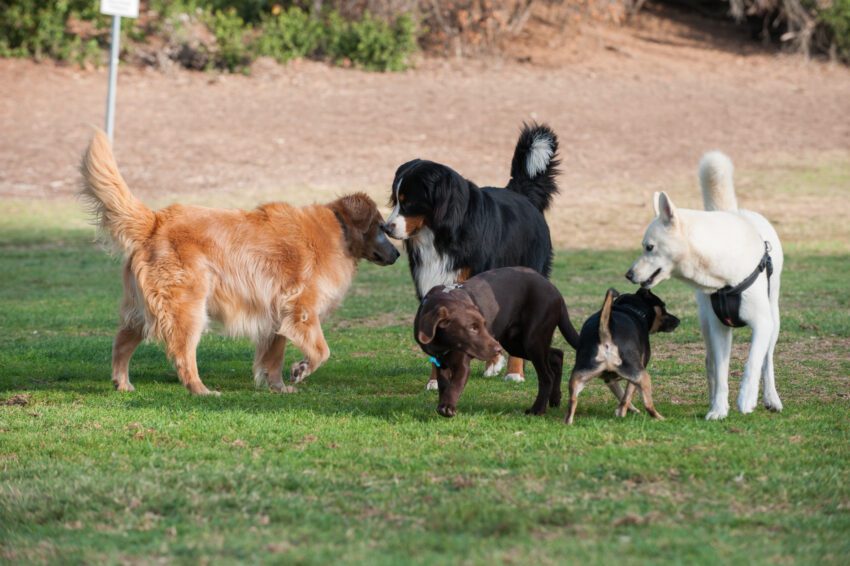
These playdates teach them about communication and boundaries with other dogs and help them burn off excess energy. A well-socialized dog is typically happier and more well-adjusted. It’s about putting them in a controlled environment and allowing them to make friends and learn from each other.
Professional Training Classes
Investing in professional training classes can provide structured learning and socialization. These classes offer more than just basic training. They’re a chance for Fido to learn in a group setting, which can benefit their social skills. Professional trainers can offer insights and techniques that might be new to you.
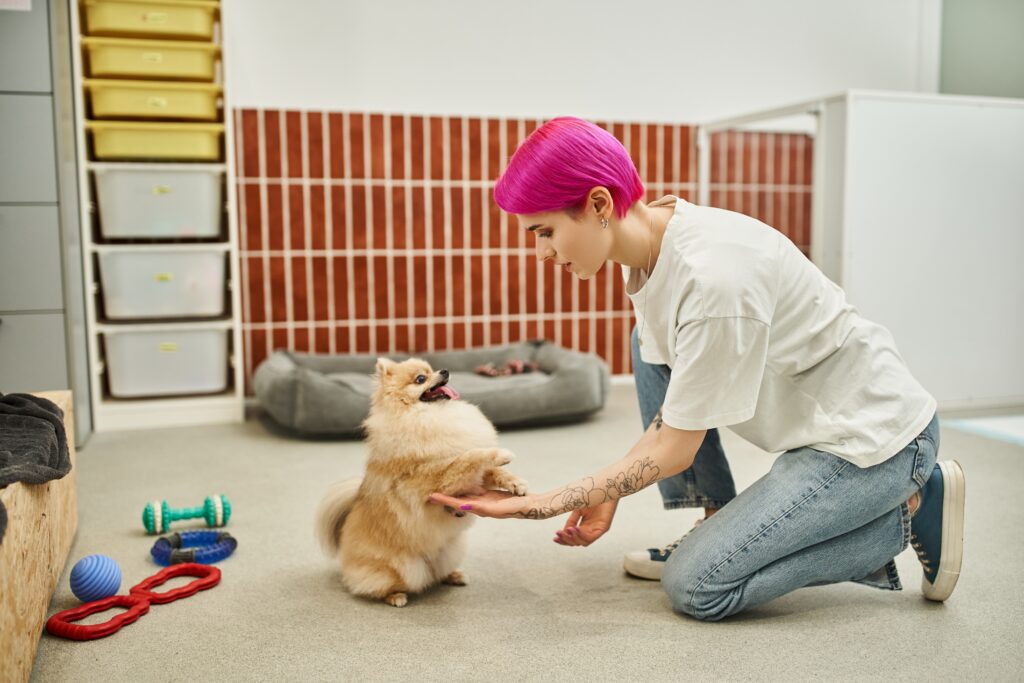
They can help address specific behavioral issues or improve overall obedience. These classes are also great for you and your beloved pup to meet other folks. It’s a community experience where you and your furry pal can learn and grow. Professional training classes are about taking your pup’s socialization and training to the next level.
Regular Grooming
Regular grooming is more than just keeping your dog looking their best; it’s crucial for their health and well-being. Grooming removes excess fur, which can be especially important during seasonal changes. It helps avoid matting, which can be painful, resulting in skin issues.
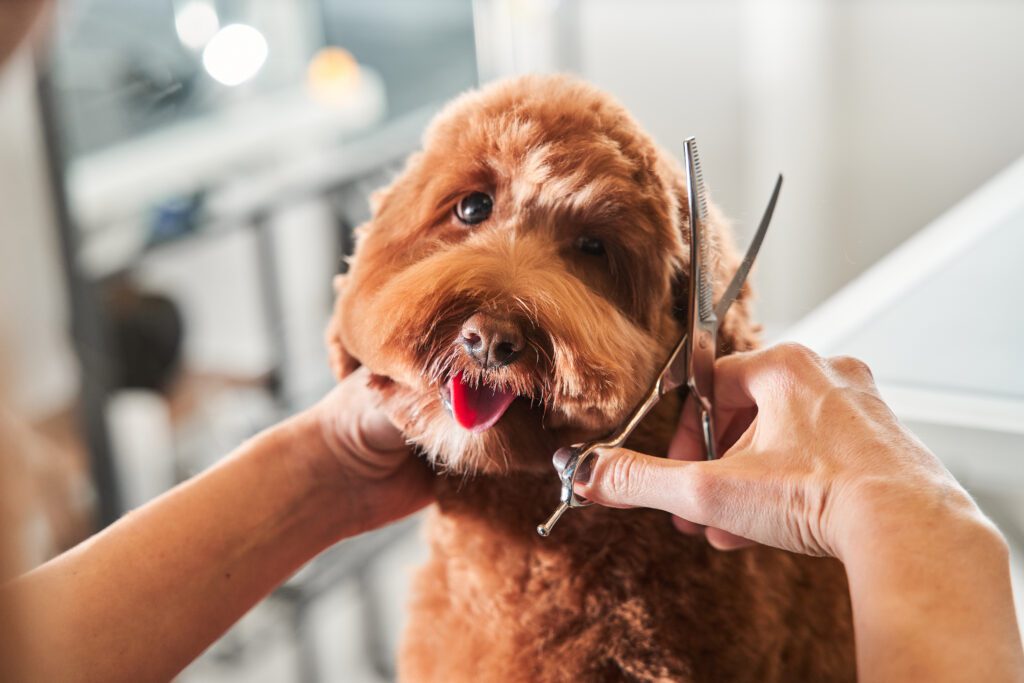
Grooming is also a bonding experience. It’s a time when you can give them your full attention. Most dogs learn to enjoy grooming, as it feels like a massage or a gentle petting session. You can also use the opportunity to spot any health issues, like lumps or skin problems, early on.
Adequate Sleep
Ensuring your dog gets adequate sleep is vital for their health. Sleep is when the body recovers from the day’s activities, and lack of it can lead to irritability and health problems, just like in humans. A good bed is important, especially for older dogs with joint pain.

It is key to respect their need for undisturbed rest by creating an environment conducive to good sleep and keeping noise and disturbances to a minimum. Adequate sleep is an often overlooked aspect of a dog’s health, but it’s just as important as diet and exercise.
Reward Calm Behavior
Rewarding calm behavior is an effective way to encourage good manners in your dog. It’s more than just giving them a treat when they do a trick or follow a command. It’s about recognizing and reinforcing when they’re being calm and relaxed.
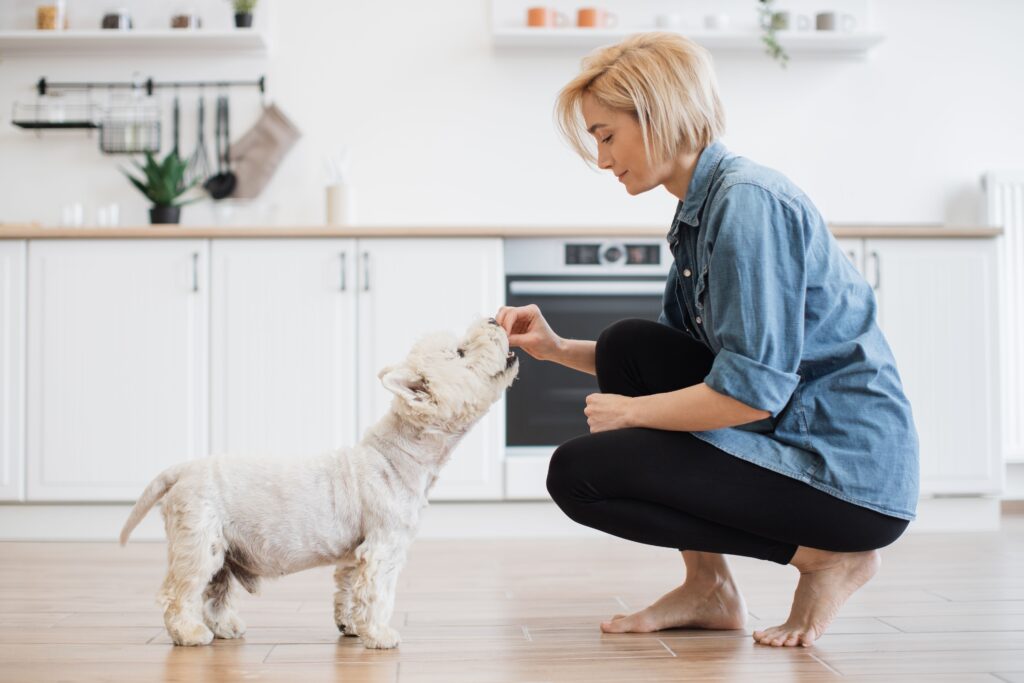
This is especially important in potentially stressful situations, like when guests visit or during a thunderstorm. By rewarding calm behavior, you teach them that being relaxed is good. This can drop anxiety levels significantly and promote a more peaceful demeanor. Aside from treats, you can also give them gentle praise or a new toy.
Avoid Boredom
Keeping your dog entertained and engaged is crucial to prevent boredom. A bored dog can become anxious or even destructive. Rotating toys and introducing new activities can keep things fresh and interesting. Imagine reading a new book or trying a new hobby; it’s stimulating.
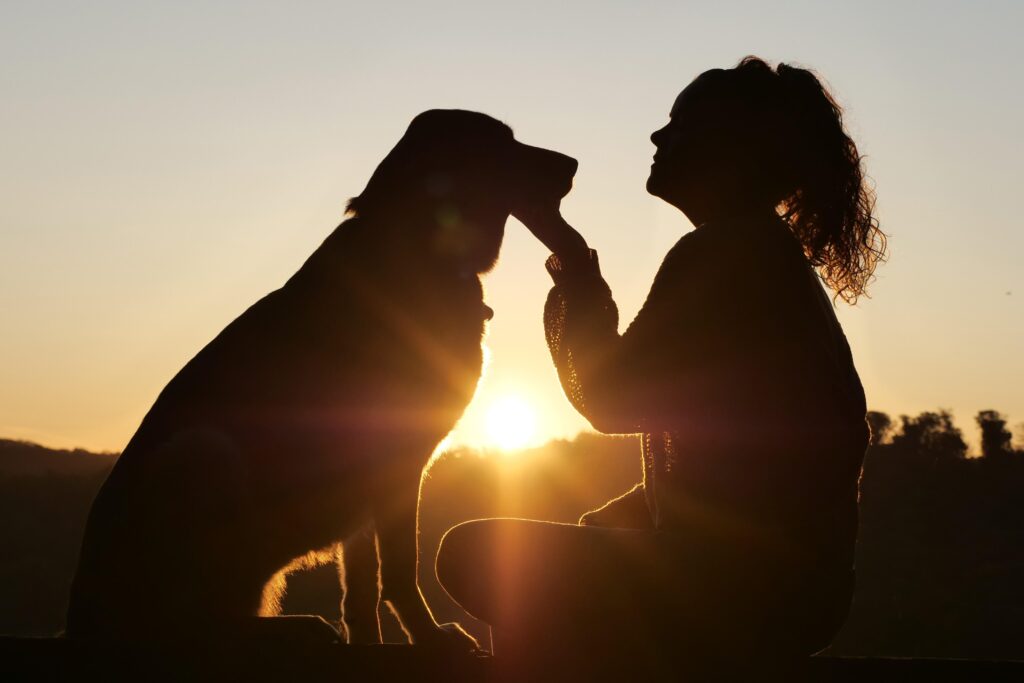
Chew, fetch, or puzzle toys offer a different challenge and fun. Regular play sessions, new training exercises, or even changes in your walking route can make a big difference. Keeping their environment varied and stimulating is essential and can make a huge difference in their behavior.
Treat-Based Puzzles
Treat-based puzzles are a fantastic way to stimulate the minds of canines. They combine the pleasure of a toy with the reward of a treat. It’s like a video game for dogs, where solving the puzzle earns them a tasty prize. These puzzles come in various shapes and sizes, each presenting a unique challenge.
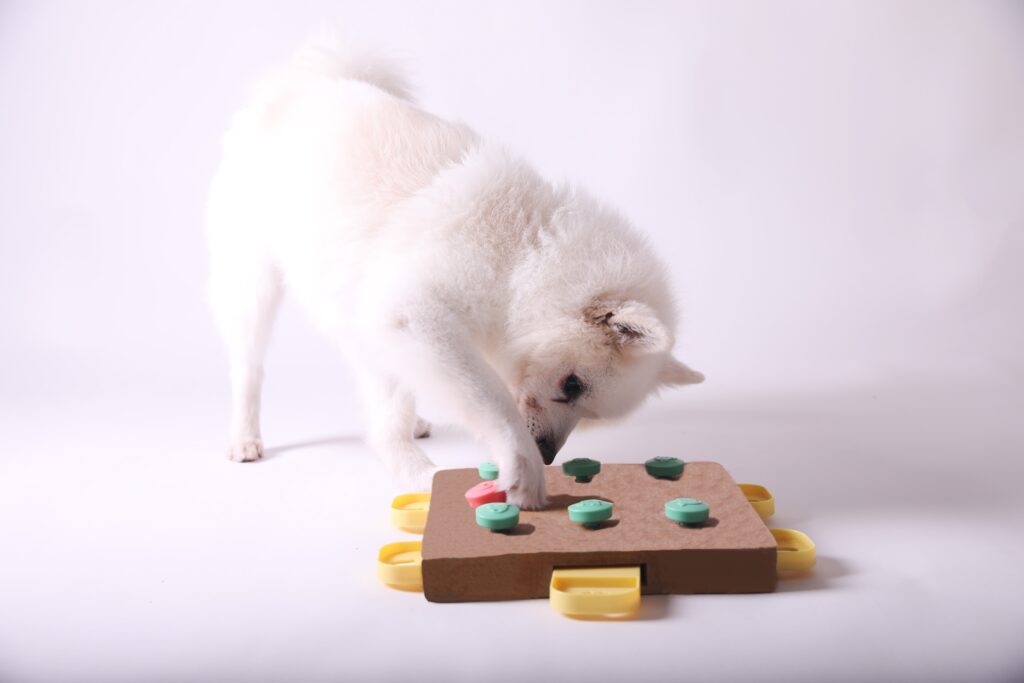
They encourage your dog to think, experiment, and problem-solve. They’re exercising their brain as they decipher how to get to the treat. This kind of mental stimulation is important for keeping their mind sharp. Plus, it’s an entertaining and beneficial way to feed your dog.
Controlled Exposure
Gradually exposing your dog to various stimuli reduces fears and anxieties. It’s like slowly getting used to the water in a swimming pool rather than diving right in. This could mean gradually introducing them to new people, environments, or experiences.
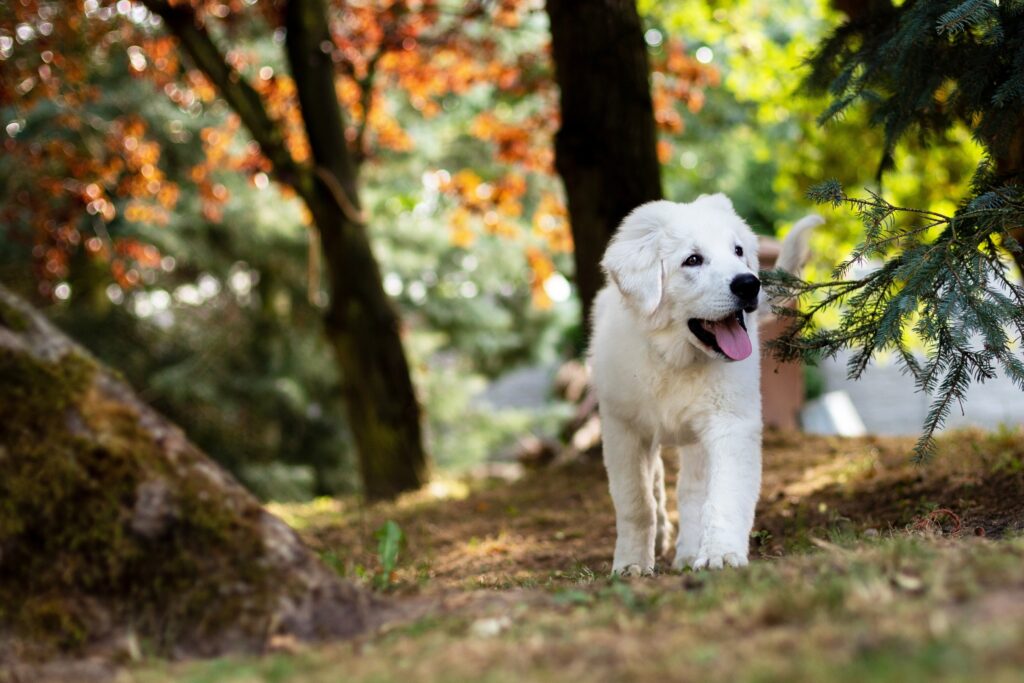
The key is to do it in a controlled and reassuring manner. Slowly and safely exposing them to new things, they learn that these experiences are not threatening. It helps build their confidence and reduce anxious reactions over time. Remember to be understanding and patient during this process.
Limit Alone Time
Too much alone time can be hard for dogs. They are social beings who can easily become depressed and lonely if left alone for too long. Consider options like a pet sitter or doggy daycare if you have a hectic schedule. These can give your dog company and stimulation when you’re not around.

It’s not just about avoiding loneliness; it’s about providing them with interaction and activity, which dogs thrive on. Having someone to interact with or a place to play can keep their spirits up. It’s about ensuring they have a happy and fulfilling life, even during your absence.
Relaxation Techniques
Training your dog in relaxation techniques can be helpful, especially in stressful situations. This could include teaching them to settle on a mat or using calming signals. These techniques can be compared to meditation for humans, teaching how to calm down and relax on command.

You can use these techniques to help them cope with anxiety and stress so they feel more secure and in control. Giving them tools to manage their emotions helps them in the long run. In many ways, dogs have similar needs to their pet parents.
Weight Management
A healthy weight is vital for your furry friend’s well-being. Just like in humans, being overweight can lead to a variety of health issues, including lethargy, joint pain, and an increased risk of chronic diseases. They must have a balanced diet and regular exercise.

Think of it as their personal fitness and nutrition plan. Observing their food intake is important, as well as avoiding overfeeding them. Treats should be given in moderation. Regular visits to the vet can help you track their weight and overall health.
Respect Their Space
Just like people, dogs sometimes need their own space, and it’s important to recognize and respect this need. They might have a favorite spot where they feel most comfortable. Allowing them time alone when required is vital for their mental health.
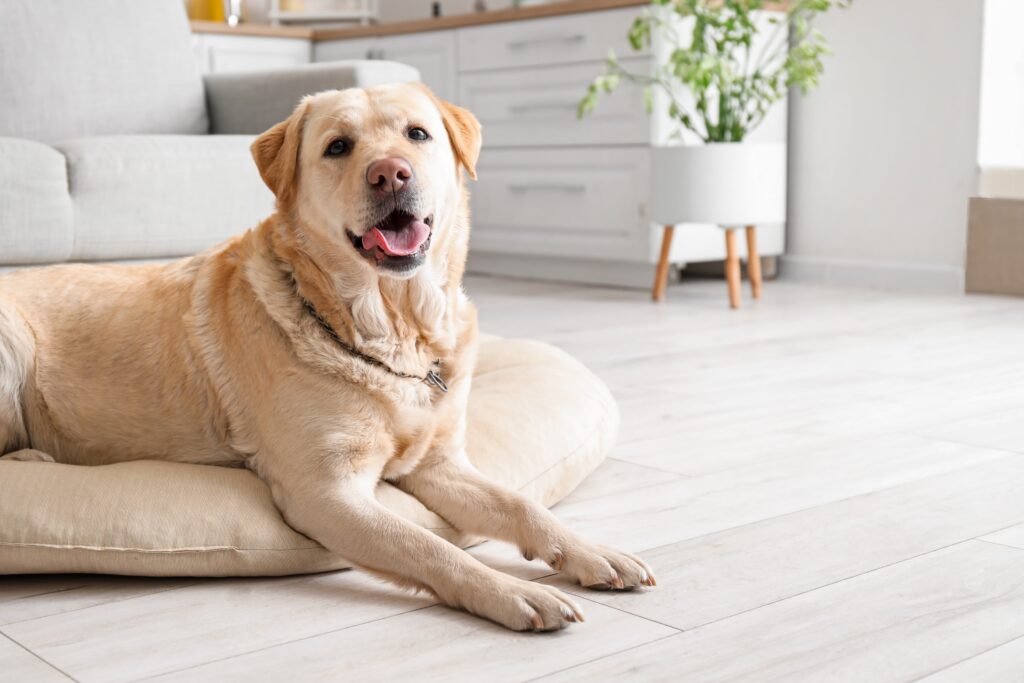
This respect for their space helps build trust and understanding between you and your dog. It shows them you recognize their needs and are willing to do what’s needed. It’s key to building a healthy, respectful relationship with your furry friend.
Companionship
Spending quality time with your dog is one of the best things you can do for them. Take them out for a walk, talk to them about your day, or play fetch with them in the backyard. This time together is crucial. It shows them they’re a loved and valued part of your family.
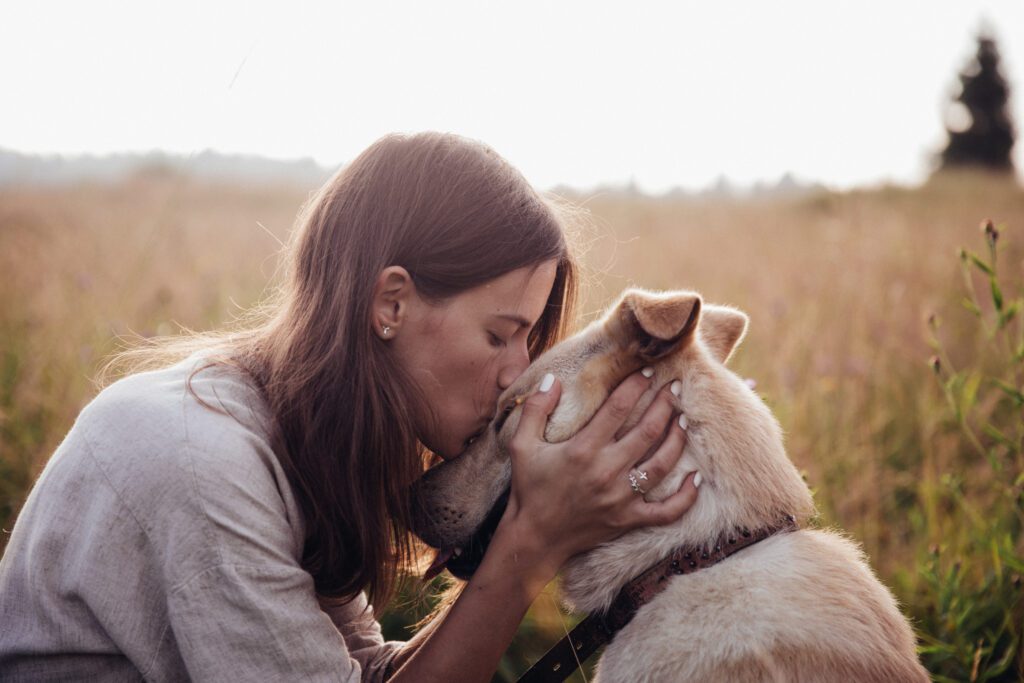
This companionship comforts them, whether sitting on the couch or as exciting as a day in the park. These moments strengthen your bond. In return, you get loyalty and unconditional love. It’s a beautiful friendship that grows stronger with every shared experience.
Observation
Being attentive to changes in your dog’s behavior is essential for their mental health. They can’t tell us when something is amiss; it’s up to us to notice these changes. They might be subtle, like a decreased appetite or a lack of interest in activities they usually enjoy. Changes can signal health issues or emotional distress.
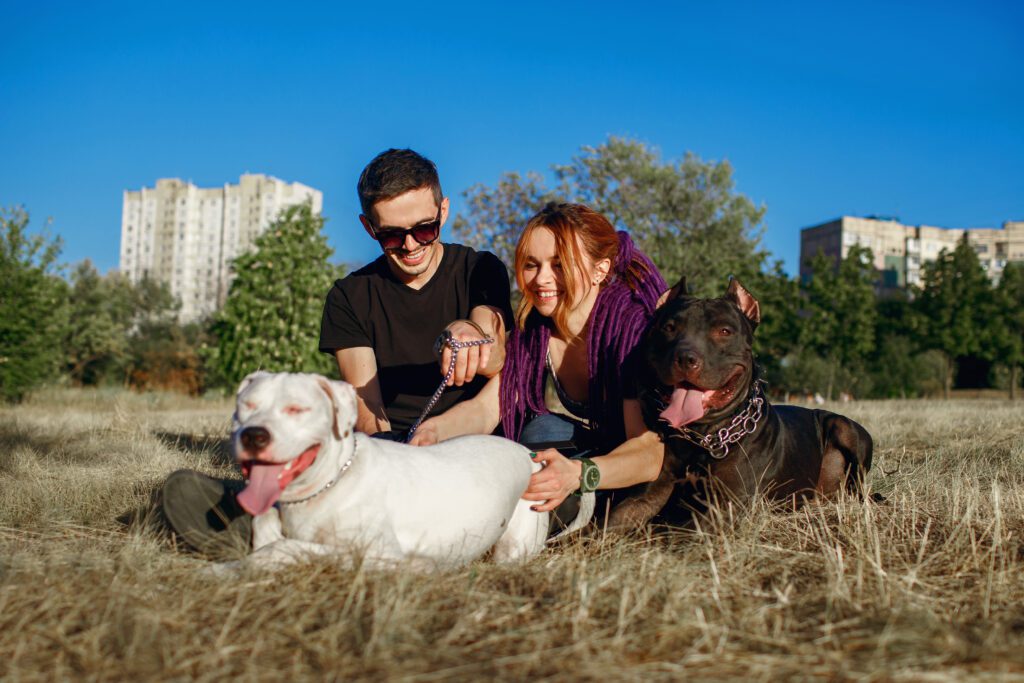
Regular observation helps you stay attuned to their needs and well-being. It’s about being proactive in their care. By noticing and attending to these changes early, you can help prevent serious complications later on. Show your dog that you’re always looking out for their best interests.
Therapeutic Dog Beds
Investing in a good bed can make a big difference in your pet’s life, especially as they age, helping them get better rest, which is important for their health. Orthopedic beds can provide extra support for their joints and improve mobility.

These beds can also help reduce pain from conditions like arthritis. It’s not just about comfort; it’s about providing them with the support they need for a good night’s sleep. Your pup deserves the best for being a loyal friend, sticking with you through thick and thin.
Professional Help
Sometimes, despite our best efforts, our dogs have issues that require professional help. This could be a vet for health issues or an animal behaviorist for behavioral problems. These professionals can offer expert advice and treatment options akin to seeing a doctor or therapist for humans.
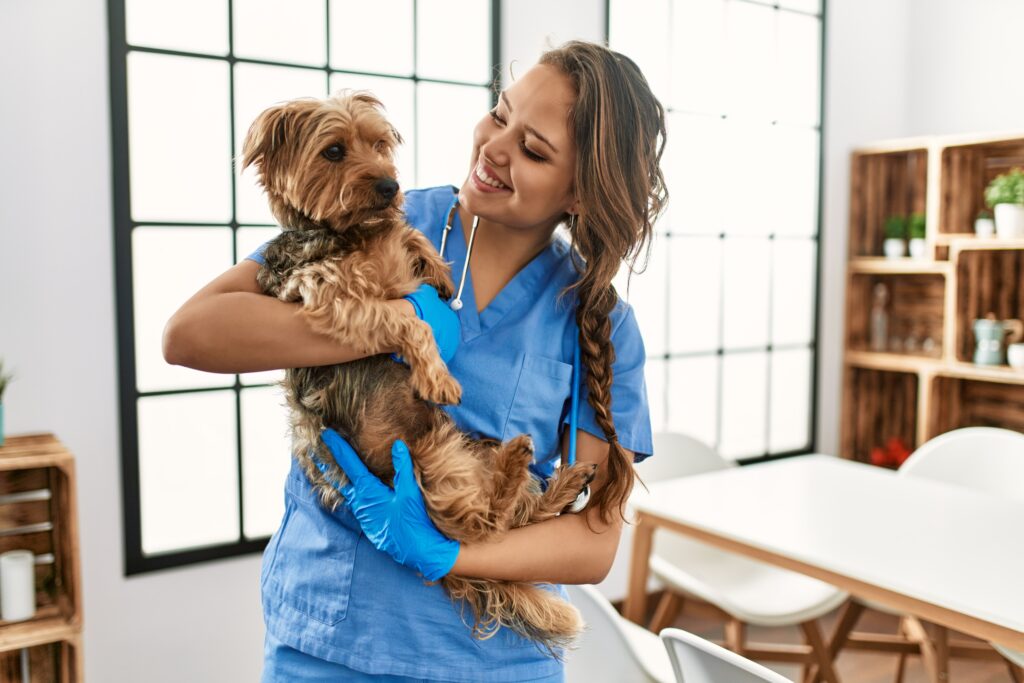
They have the training and knowledge to diagnose and treat various issues. Seeking professional help is a sign of a responsible pet owner. It shows that you’re committed to your dog’s well-being and are willing to do what it takes to help them.
Limit Changes
Dogs, much like people, can find too many changes overwhelming. It’s important to introduce new things into their life gradually. This could be anything from a new baby to a change in their routine. Think of it like adjusting to a new job or moving to a new address; it takes time to get used to.
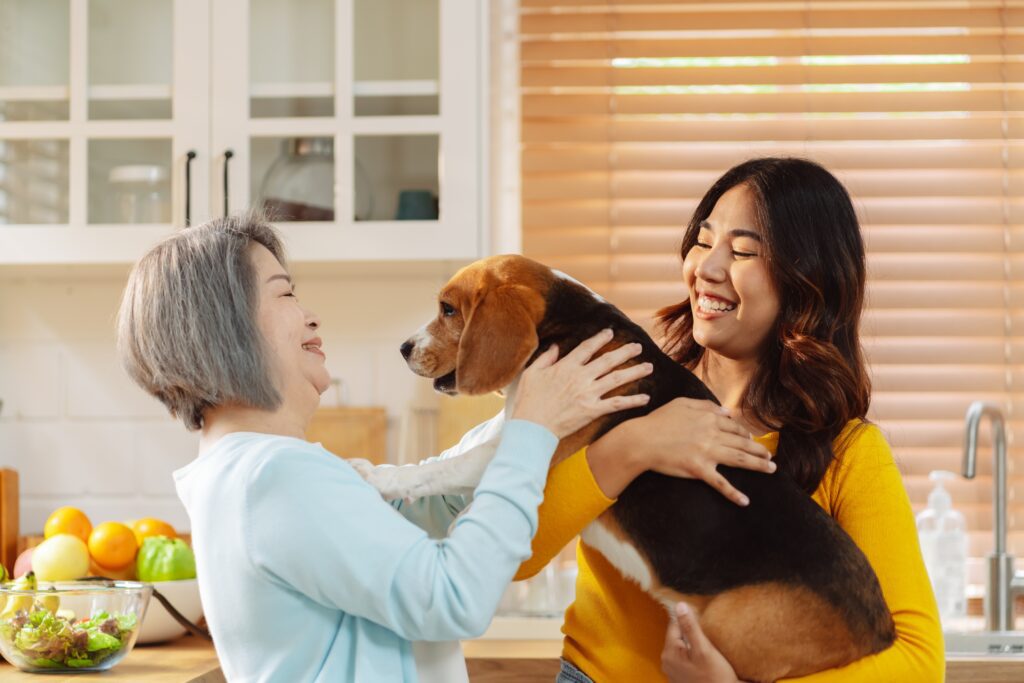
A stable environment is comforting to dogs. Introducing changes slowly helps them adapt without feeling stressed or anxious. While some change is inevitable, managing it carefully ensures your dog feels secure and happy. The goal is to make the transition as smooth as can be.
Mindful Petting
It is also important to understand when your dog enjoys being petted and when they prefer not to be touched. Just like humans, dogs have their boundaries. Some may love a good belly rub, while others might not be as comfortable with lots of physical contact.
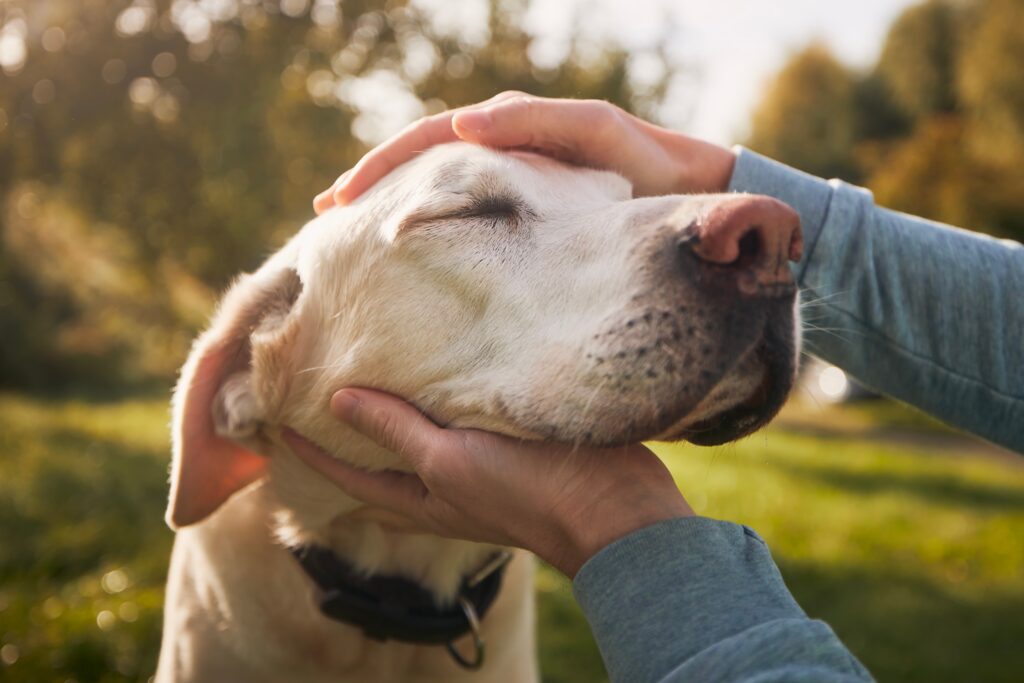
They will show signs when they enjoy the attention or have had enough. Respecting these signals builds trust. It’s about communicating with your dog in a way that appreciates their personality and preferences. Mindful petting strengthens your relationship with your dog on their terms.
Sufficient Water Intake
Keeping your dog well-hydrated is as important as feeding them. Water is essential for their overall health. Dehydration can affect their mood and energy levels, just like it does in humans. Ensuring constant access to clean and fresh water is a simple but vital aspect of their care.
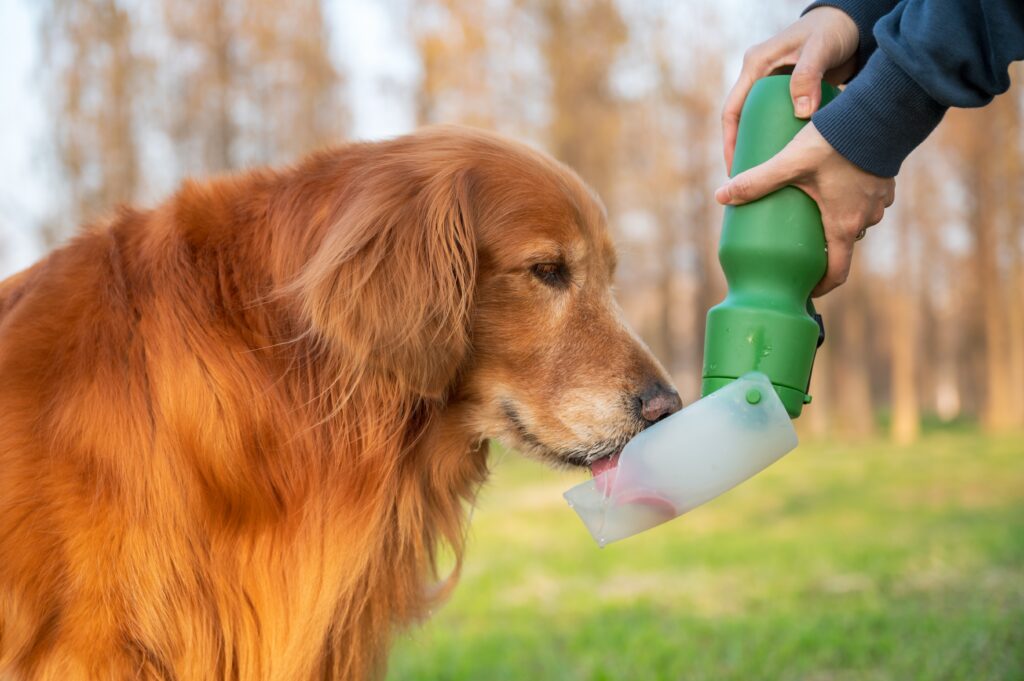
Water supports various bodily functions and helps keep them feeling good. Observing their water consumption is crucial, as changes can indicate health issues. Bring them to the vet immediately if their water consumption has significantly declined, which could indicate serious problems.
Chew Toys
Chew toys are not just for fun; they’re a natural stress reliever for dogs. Chewing is a natural behavior for canines, helping ease boredom and stress. Providing safe and appropriate chew toys is important because it gives them an outlet for this natural instinct.
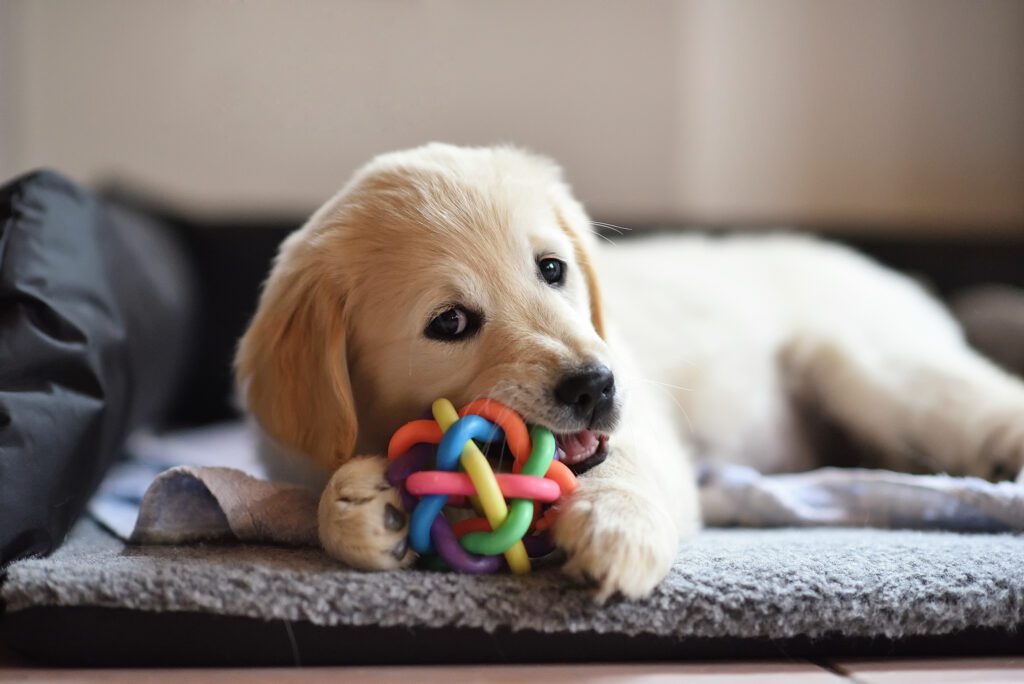
Dogs might turn to inappropriate items, like shoes or furniture, without proper chew toys. Furthermore, chew toys help with hygiene and strengthen jaws. It’s like giving them a fun and beneficial activity to focus on. Remember your pup’s chewing habits and size when choosing a chew toy.
Encouragement and Support
Providing emotional support to your dog is crucial, especially during stressful times. Dogs, much like humans, can experience stress, anxiety, and fear. Your support and reassurance can make a big difference to them, making them feel that they’re not alone.

In challenging situations, staying calm and providing gentle reassurance can help them feel more secure. It’s about acknowledging their achievements and being there for them through the ups and downs. Your encouragement and support strengthen your bond and help build their confidence.
